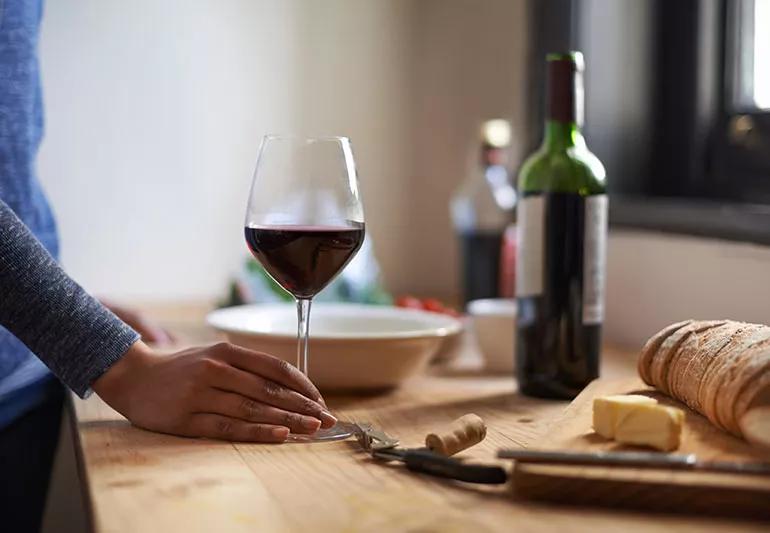Find out if liquid calories are crashing your party and your diet

You’re humming along on your diet, losing one or two pounds per week and feeling good about yourself. In fact, you’re feeling so good that you’re congratulating yourself with a glass (or two) of wine in the evenings.
Advertisement
Cleveland Clinic is a non-profit academic medical center. Advertising on our site helps support our mission. We do not endorse non-Cleveland Clinic products or services. Policy
Suddenly, you hit a weight loss plateau. You’ve been eating healthier and exercising, so what could it be? The culprit may be the wine, unfortunately. You may be thinking “wine is just grapes, right?” Wrong. Wine has more calories than you might think.
We hate to spoil the party, but it’s important to be aware of how much wine you’re drinking. One 5-ounce glass of wine averages at about 125 calories, no matter red, white or sparkling.
Multiply that by two or three glasses, and now you’re up to almost 400 calories. Registered dietitian Julia Zumpano, RD, LD helps break down what you need to know.
Alcohol is metabolized differently than food. “First, it can’t be stored, and second, it has to be converted from its ingested state to one that is not so poisonous,” says Zumpano.
It passes through your stomach and enters the bloodstream and the brain. But ultimately, alcohol must find its way to the liver, which is the only organ that knows what to do with it.
There, it takes center stage. Your liver lets alcohol go to the front of the line, before other nutrients, because it simply needs to break it down into CO2 and water and get it out of your body.
Is all this science making you want to pause and take a sip of wine yet?
Advertisement
The pathways and mechanisms by which alcohol metabolism occurs read like they’re straight from a chemistry textbook. But on the most basic level, alcohol metabolism involves the breakdown of enzymes and the elimination of the byproducts.
“Your sex, age, body size and genetics all play a role in how quickly alcohol is eliminated from your body,” says Zumpano.
Alcohol also clouds your judgment about healthy food choices. This is a problem when you’re watching your weight. Pairing a glass of wine with cheese and crackers, or chips and dip, can seem not only harmless but, when you’re tipsy, can also seem like a great idea.
If you really want to cut down on liquid calories, Zumpano shares five tips for doing so:
For the same number of calories as a glass of wine, you could be nourishing your body with a healthy and tasty snack. Again, wine isn’t just grapes. Some of Zumpano’s favorites are:
Take a look at your wine consumption, then try some of these ideas to see if they help get you back on your weight-loss plan!
Advertisement
Learn more about our editorial process.
Advertisement

Your tolerance decreases with age, thanks to body changes, health conditions and medications you may take

‘Blackout rage gallons’ can lead to dangerous levels of alcohol consumption

An enzyme deficiency or rosacea are potential causes of alcohol flush

ACV may help lower blood sugar and calm acid reflux, but don’t believe all the hype

Yes, grabbing a few beers or a couple of glasses of wine or cocktails with friends can increase your heart rate — dangerously in some cases

Alcohol (in any amount) is a well-known cause of cancer

Forget the myth and answer nature’s call when your bladder feels full

Alcohol provides empty calories, heightens cravings and may slow down your metabolism

The tropical fruit is a good source of antioxidants and vitamin C

Most people fall asleep within 10 to 20 minutes, but if your experience is different, adjusting your sleep schedule may help

Exploring your hidden side can lead to better understanding of what makes you tick